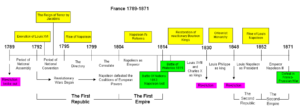Eugene’s privileged lifestyle was to come to an abrupt end when he was 9. The Revolution of 1789 had set out to destroy the Church and its domination over the lives of people. The noble de Mazenod family had to flee into exile. Yvon Beaudoin gives us the background:
The First Republic was proclaimed on September 21, 1792 and lasted until May 28, 1804 when it was replaced by the Empire under Napoleon. Eugene rarely mentions them, but had to live with the effects of their reign. It was during this period that the French Revolution was violent. It began peaceful enough with the goal of shifting from a society based on privilege to a society where equality was the law for everyone. On August 4, 1789, feudal privileges were suppressed by the National Assembly. The Assembly proclaimed the Declaration of the Rights of Man on August 26. The parliament of Aix, just like parliaments in the other parts of the country, was suppressed by the decree of September 7, 1790; suppressed as well was the Court of Accounts on July 4, 1791.
A counter revolutionary movement began to form in Aix. In opposition to this, militant clubs were formed to defend the Revolution. In December 1790, unrest broke out, mobs wanted to seize a few aristocrats, a few of whom were hung on the boulevard which passes in front of the de Mazenod mansion. It was at that time, about December 13, 1790, that, disguised as a hunter, President de Mazenod fled to Nice where, in February 1791, he called for Eugene to join him.
http://www.omiworld.org/en/dictionary/historical-dictionary_vol-1_r/932/republics/


Yesterday we read of how Eugene’s father ‘emigrated’ to Italy and I remember thinking how civilized, clean and orderly that sounded. It seemed to clean up and soften what I had learned about the situation in France. This morning though we get a taste of the urgency that Eugene’s father felt in leaving Aix, having to disguise himself to ensure his safety he ‘fled’ to Nice.
I can only imagine what that had to have been like for not only himself but for the family he left behind. And what did it look like for Eugene who on his own at 8 or 9 years of age had to also leave and join his father. Was it an adventure? Was he scared?
I began this morning thinking that I simply could not understand such violence, a whole country with so many of it’s people becoming violent. But as I sat here I realized that I cannot divorce myself from any of it.
I have grown up in a country that has seemed to be more-or-less peaceful, where such atrocities have not and are not committed, not allowed. Over the years I have met some people who have had to flee their own countries. I was sad for them but kept myself somewhat detached from it all. Recently I had the opportunity to take part in what is called the “Blanket Project” which was put on by Kairos here in Ottawa. It is an experiential way of learning and realizing how our indigenous peoples here in Canada were treated (and in ways it is ongoing). It was not so blood thirsty to see as the French Revolution appeared to be but was just as deadly, perhaps even more so. It was done by businesses and governments, laws were passed and it was all quite legal. It was clean and sophisticated in a way – quite ‘civilized’. It put ‘us’ before and above the peoples already living here. So I had the privilege of experiencing in a very small way what was done to our first peoples here in Canada. It left me feeling heavy and sad, burdened down and wondering what I could do – in a way to atone, but more deeply in a way to what I could do but more wondering how we could walk together so that we could all heal.
Awaking this morning I silently groaned because I knew that this place would be a place of learning abut the politics etc of Eugene’s time. Not really my thing. But once here I learned some things – like how we can all be blind to seeing some things, and how we can detach ourselves or how we can join to walk with others.
Oddly the more I learn about Eugene, the more I love him.